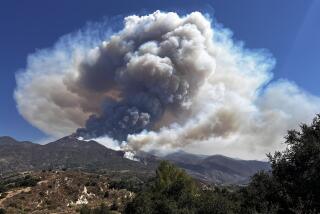State sues U.S. Forest Service
California sued the U.S. Forest Service on Thursday over plans that would open more than 500,000 acres to roads and oil drilling in the state’s largest national forests.
The four Southern California forests -- Los Padres, Angeles, San Bernardino and Cleveland -- comprise more than 3.5 million acres that stretch from Big Sur to the Mexican border.
They provide habitat for 31 threatened or endangered animal species, including the California condor, and 29 such plant species.
“California wants to keep these forests without roads, and the Bush administration is just operating with reckless disregard for the public trust,” State Atty. Gen. Jerry Brown said in a telephone interview. “I find it kind of ironic that the federal government won’t let us clean up our cars and they now want cars going through these forests. Once they build these roads, cars come, then they go in and chop down trees. Roads are the first step.”
The lawsuit alleges that the Forest Service violated the federal National Environmental Policy Act and the National Forest Management Act by not informing the state of potential environmental effects of its plan and by not coordinating with the state and working with its laws and policies. Since 2006, California has had a moratorium on road construction in pristine areas of its national forests.
State officials also took issue with the roughly 500,000 acres the Forest Service has set aside as wilderness land, an amount that environmentalists and scientists said is half of what would be necessary to protect habitat.
In an exchange of letters in 2005 and 2006, state Secretary for Resources Mike Chrisman discussed the state’s concerns over the forest management plans with two regional foresters who assured him that they would “honor these commitments” to California to maintain roadless areas.
“In our view, the commitments made to us were not lived up to,” Chrisman said. “The people in California derive a great amount of benefit from these forested landscapes, not only for recreational purposes but for watershed protection and other protections, and for us.”
Mike Odle, a spokesman for the U.S. Forest Service, said the agency was reviewing the lawsuit and could not comment on specifics. But he confirmed that the agency had been exchanging letters with the state on “numerous issues” regarding forest management plans, which provide a framework for supervisors and remain in effect about a decade.
“My understanding is the provisions that are affecting road building in our plans were made necessary to accommodate access for fire suppression,” Odle said. “We have a really good working relationship with the state of California, and so what we’re hoping to do is . . . start off by working with the state by seeing if we can resolve those issues.”
The issue of roadless areas in national forests has long been contentious.
The Roadless Area Conservation Rule, developed during the Clinton administration and adopted in 2001, prohibited most road construction and logging throughout millions of acres of the country’s national forests.
In 2005, the Bush administration repealed the rule, allowing states to submit petitions to adopt their own plans. The repeal was struck down in court and the rule was reinstated in 2006.
The forest management plans submitted for the four Southern California forests were approved in September 2005, four months after the rule was repealed. In July 2006, Gov. Arnold Schwarzenegger filed an appeal asking the Forest Service to revisit the issue of roadless areas in those plans. The appeal was denied.
The 2001 roadless rule is being challenged in a Wyoming court. Meanwhile, Idaho and Colorado have been trying to open up their roadless areas: 6 million acres in Idaho for potential logging and mining, and 4.1 million acres in Colorado for possible development.
“The bottom line is because there’s uncertainty now about how roadless areas are going to be managed nationally, specific efforts to guarantee the four forests in Southern California are protected become all the more important,” said Sara Barth, California/Nevada regional director for the Wilderness Society.
--
More to Read
Sign up for Essential California
The most important California stories and recommendations in your inbox every morning.
You may occasionally receive promotional content from the Los Angeles Times.










